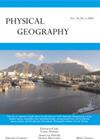Retrieving dry snow stratigraphy using a versatile low-cost frequency modulated continuous wave (FMCW) K-band radar
IF 1.4
4区 地球科学
Q4 ENVIRONMENTAL SCIENCES
引用次数: 0
Abstract
ABSTRACT Considering the increased popularity for backcountry mountain recreation activities, potentially problematic snowpack interfaces are currently of great interest given their impact on snow stability. The identification of interface vertical locations and spatial variability in the snowpack is essential for avalanche danger forecasting. The Gaspé Peninsula specific climate often leads to a complex snowpack development, where the need of improved monitoring is important. The goal of this research is to assess an automated method to detect contrasted snow interfaces using a 24 GHz Frequency Modulated Continuous Wave (FMCW) portable radar. Based on different in-situ configurations, we compared the radar amplitude signals with in-situ snow geophysical measurements, including SnowMicroPenetrometer (SMP). Radar measurements have been done following two different protocols: (1) mobile radar looking-up and down in order to understand the radar-snow wave interactions and optimize its parameters for spatial variability assessment of contrasted snow layers and (2) fixed radar looking-up to evaluate its potential in monitoring snow stratigraphy temporal variability. Results show good agreements with compared validation data with 80% of manually identified interfaces detection and a vertical positioning error of 3 cm. The presented FMCW radar appears to have a good potential for spatial and temporal variability assessment of snowpack stratigraphy.使用多功能低成本调频连续波(FMCW)K波段雷达反演干雪地层
摘要考虑到野外山地娱乐活动越来越受欢迎,考虑到积雪界面对雪的稳定性的影响,目前人们对其潜在的问题非常感兴趣。雪堆中界面垂直位置和空间变异性的识别对于雪崩危险预测至关重要。加斯佩半岛特有的气候往往会导致复杂的积雪发展,因此需要改进监测。本研究的目标是评估一种使用24 GHz调频连续波(FMCW)便携式雷达检测对比雪界面的自动化方法。基于不同的现场配置,我们将雷达振幅信号与包括SnowMicroPenetrometer(SMP)在内的现场雪地球物理测量结果进行了比较。雷达测量是按照两种不同的协议进行的:(1)移动雷达向上和向下观察,以了解雷达-雪波的相互作用,并优化其参数,用于对比雪层的空间变异性评估;(2)固定雷达向上观察,以评估其在监测雪地层时间变异性方面的潜力。结果与对比验证数据吻合良好,80%的人工识别界面检测和3cm的垂直定位误差。所提出的FMCW雷达似乎在积雪地层的空间和时间变异性评估方面具有良好的潜力。
本文章由计算机程序翻译,如有差异,请以英文原文为准。
求助全文
约1分钟内获得全文
求助全文
来源期刊

Physical Geography
地学-地球科学综合
CiteScore
3.60
自引率
0.00%
发文量
18
审稿时长
6 months
期刊介绍:
Physical Geography disseminates significant research in the environmental sciences, including research that integrates environmental processes and human activities. It publishes original papers devoted to research in climatology, geomorphology, hydrology, biogeography, soil science, human-environment interactions, and research methods in physical geography, and welcomes original contributions on topics at the intersection of two or more of these categories.
 求助内容:
求助内容: 应助结果提醒方式:
应助结果提醒方式:


